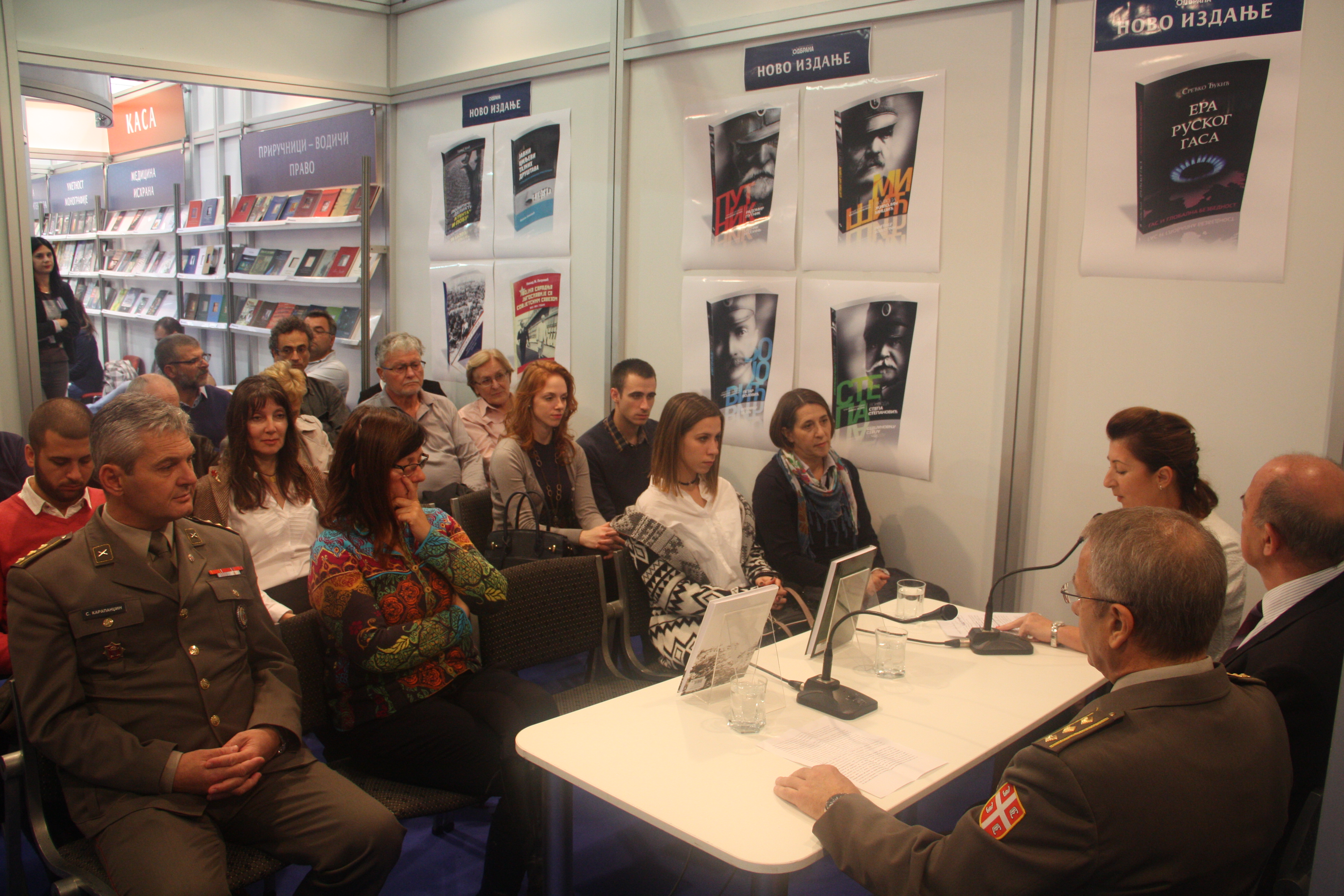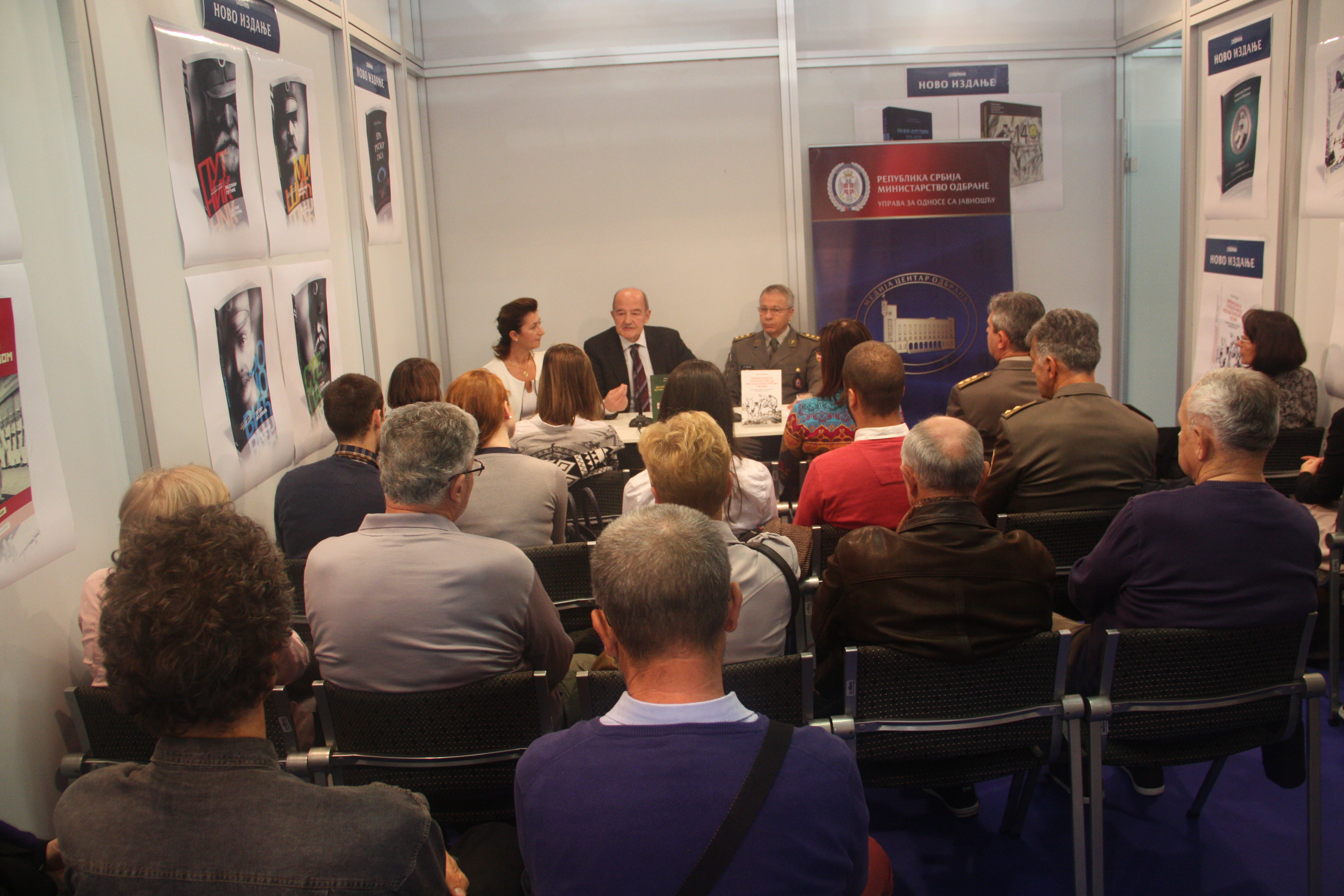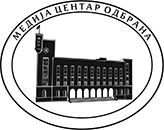30.10.2016
The last day of the Book Fair
 During the last day of 61st International Belgrade Book Fair, another two books were presented published by Odbrana Media Centre – ‘From Partisan Medical Units to Military Medical Service 1941-1945’ by Brigadier General (retired) Veljko Todorović PhD and General Major (retired) Branislav Popovic ‘Infectious Diseases in Serbian People and Military during the 20th Century Wars – The work of Serbian medical service on their prevention and treatment’ written by Colonel Prof. Dragan Mikic, Acting Head of the Clinic for Infectious and Tropical Diseases of the Military Medical Academy.
During the last day of 61st International Belgrade Book Fair, another two books were presented published by Odbrana Media Centre – ‘From Partisan Medical Units to Military Medical Service 1941-1945’ by Brigadier General (retired) Veljko Todorović PhD and General Major (retired) Branislav Popovic ‘Infectious Diseases in Serbian People and Military during the 20th Century Wars – The work of Serbian medical service on their prevention and treatment’ written by Colonel Prof. Dragan Mikic, Acting Head of the Clinic for Infectious and Tropical Diseases of the Military Medical Academy.Opening the promotion, the Director of Odbrana Media Centre, Colonel Stevica Karapandzin, pointed out that the third year in a row that institution placed focus of its publishing activities primarily on marking 100th anniversary of the First World War, and that in each of those three years there had been several publications about the Serbian military medical service. And according to his words, there will be more of them in the future, since the “medical service” is one of the unavoidable topics.
Speaking about the book “From Partisan Medical Units to Military Medical Service 1941-1945”, the editor Mirjana Sandic said that its authors are not famous solely as doctors and high military managers, but are also known as writers of numerous books and scientific articles on military medical service. From the viewpoint of their profession they are competent narrators about the military medical service.
The authors presented the development of medical units in Partisan conditions in three parts. First, they briefly gave a chronological development of the medical service in Partisan conditions, and then, the content of the second part is thematically elaborated with somewhat wider explanations of causes and consequences, and lastly the third part consists of 62 biographies of the most significant and decorated national heroes, doctors, students of medicine and nurses.
She emphasised that Serbian military doctors, medical technicians and nurses had stood by the soldiers and people, often in the first front lines, providing medical assistance to the wounded. Around 5000 doctors, pharmacists, students of medicine and pharmacy participated in the People’s Liberation War, while near 600 highly specialised members of the medical service had lost their life.
Retired Brigadier General Veljko Todorovic, PhD spoke in greater detail about the book. He said that volumes had been written about the medical service in the Second World War so that he and General Popovic were able to use a great number of excerpts while producing the book, along with many works of literature by the most famous authors, original archival published and particularly unpublished material, which enabled the authenticity of the researched, processed and written text. Although faced with the abundance of literature, they managed to concisely shed light on numerous important events during different developmental phases of the PLW (People’s Liberation War). Hence, the monograph shows the organisation and operation of the medical service during the War, but some other key topics were researched and elaborated such as surgical service in PLW from 1941 to 1945, caring for internal-medicine patients, fighting infectious diseases. A separate chapter is dedicated to the significant topic of the procurement in PLW. The contribution made by nurses in providing care was not left out, as well as the participation of the Red Cross and assistance rendered by the Allies for the treatment of patients.
-Our goal was to write, based on what others had researched, a monograph that would be easily available, readable and entertaining for the writers. And the other thing is that showing the noble examples of the entire service during the War and many individuals, we wish to motivate today’s generation of medical workers to more actively and better fight for their status, their ethics and all other that makes our medicine – said doctor Veljko Todorović.
 The second book “Infectious Diseases in Serbian People and Military during the 20th Century Wars – The work of Serbian medical service on their prevention and treatment”, written by Colonel Prof. Dragan Mikić, is for the time being a unique reading matter in this field since the author comprehensively analysed the problem of infectious diseases in the territory of Serbia throughout the entire century, abounding in wars and suffering of soldiers and population.
The second book “Infectious Diseases in Serbian People and Military during the 20th Century Wars – The work of Serbian medical service on their prevention and treatment”, written by Colonel Prof. Dragan Mikić, is for the time being a unique reading matter in this field since the author comprehensively analysed the problem of infectious diseases in the territory of Serbia throughout the entire century, abounding in wars and suffering of soldiers and population.-Numerous instructions and sanitary and epidemiological measures introduced in peace time are often poorly applied or even forgotten in the conditions of war. The epidemics were and will remain a threatening danger – they break out suddenly and leave immeasurable consequences. They have always presented a challenge to health and medical services of a state – emphasised Mirjana Sandic, quoting the author.
The reviewer of this book, Doctor Branislav Popović believes that Prof Mikić approached this problem in a specific, unique and original manner, using abundant literature. Namely, the book draws on 170 references, huge number of them stemming from the research of the author himself. Predominant infectious diseases and epidemiological characteristics were determined for each period and the respective work of the Serbian medical service. General Popovic believes that the said quotes have enriched this book and that they make part of a decade long research of the history of military medical service in the Balkan Wars and the First World War.
Colonel Prof Mikić has demonstrated how the infectious diseases of epidemic character appeared as a consequence of unsanitary conditions and emergencies, in places with large concentration of people, primarily in the conditions of war. He described in detail the epidemic of typhus in Serbian Army, which had taken the greatest toll and belongs among the greatest diseases that the world has known – the hundreds of Serbian soldiers and civilians contracted and died of it. It was not until the application of the “Serbian barrel”, later named the “Partisan barrel”, that there existed an adequate means of mass disinfection which was a landmark moment that brought about the revolution in the fight against the typhus.
Presenting the book at the promotion, Colonel Prof Mikić underlined that it was the privilege for him to have been, for ten years, a member of a group that studied the history of the Serbian medical service which had been led by General Branisalv Popovic and an eminent historian of the Serbian military medical service Doctor Aleksandar Nedok.
He noted that by gaining insight in often scarce historical material and hospital records of the then Serbian doctors – Dr Sima Karanović, Dr Mihajlo Petrović, Dr Lazar Genčić, Dr Roman Sondermajer, Dr Vladimir Stanojević and Dr Dimitrije Antić – he bitterly realised that at the beginning of the 20th century it had been diseases more than bullets that brought death to our people and soldiers. This is supported by journals of renowned foreign doctors, great friends of Serbian people, such as Arius van Tinhoven and Dr Ludwig Hirszfeld, who unconditionally helped the Serbian military.
-They witnessed the “quixotic struggle” that weak Serbian military medical service waged taking care of vast number of the most seriously ill infectious patients. As an infectologist, I was impressed by sacrifices made by few Serbian doctors treating the ill, while they were lacking everything – medicines, vaccines, medical equipment, accommodation capacities and even the medical personnel of all specialities. On the other hand, as a medical officer I was disappointed, the most often due to weakness of our medical service at that time, but also because of insufficient awareness, inexplicable omissions made by the managing structures and often poor organisation. And yet, sometimes, all it took was to know and take elementary sanitary-epidemiologic measures.
Colonel Prof Dragan Mikić, speaking about the poor organisation, quoted the works of Lieutenant Colonel Vladimir Stanojević, the Head of Morava Standing Military Hospital in Niš near Ćele kula, who had reported on a disastrous condition, the condition that the famous Polish bacteriologist Dr Hirszfeld described as: Hell, true hell.
The author also questioned why Dr Emile Conseil, who with Dr Charles Nikolle determined the pathogens causing typhus, and who was in hospital in Valjevo from 1914, did not engage more in the fight against that pestilence.
As Prof Mikic pointed out, all those facts awoke defiance in him of infectious diseases epidemics, and, writing about infectious diseases in the 20th century, he wanted to warn the people and the medical service about the serious trouble that may happen to us in this century, one of them already looming up – bioterrorism.
-It is necessary to keep reminding ourselves of epidemics of infectious diseases, to study them incessantly, and to be afraid of them, to educate the population about them, because infectious diseases, particularly in times of natural and war disasters, come when we do not expect them, when we drop our guard and when we forget – said the author.
By writing this book he tried to prevent the last one - forgetting. We are reminded of that by 200 pages divided in eight chapters and some hundred original photographs, illustrations and graphs from the said period. And yet, the hope for better tomorrow is given by a motto at the beginning of the book. The author quoted the works of our Nobel Prise winner Ivo Andric: “As long as there is dark, there will be sunrise”.
 PHOTOGALLERY
PHOTOGALLERY
